Posted by Sean Dickerson on Saturday, January 6th, 2018
The African American Museum & Library at Oakland celebrates an arts champion.
E.J. (Evangeline) Montgomery, who had been active in the Los Angeles art networks in the 1950s and 1960s, moved to Oakland in 1965 and by 1967 had founded an African American artists' advocacy group called Art West Associated North (AWAN). Like other political organizations concerned with African American visibility and self-definition, the association protested the exclusion of African American artists from local museums and galleries. In a note published in the exhibition catalog "New Perspectives in Black Art" (held at the Oakland Museum Kaiser Center Gallery in October 1968) Montgomery wrote, "Black people want to know their artists. They want us to record events ourselves. This presupposes a group effort wherein Black artists combine their intellectual, physical, and material resources in a an immediate response to their Black community."
AWAN membership included prominent African American artists in northern California, including Frances Dunham Catlett, and paralleled trends within the larger Black Arts Movement towards greater self-definition. During the year of AWAN's founding, the BlackMan's Art Gallery opened in San Francisco, the first in the country owned privately by an African American and devoted exclusively to African American visual art. Run by ex-cable car gripman and self-taught painter W.O. Thomas, the gallery operated until 1973 and its records are now held at UC Berkeley's Bancroft Library.
In 1968 Montgomery joined the staff of the Oakland Museum as an art consultant under the museum's Cultural and Ethnic Affairs Guild (later responsible for founding the Black Filmmakers Hall of Fame and the first Oakland Black Cowboy Association parade). Promoting itself as the 'people's museum' even before it opened in 1969, the Oakland Museum nevertheless continued to operate under an exclusively white governing board. Community protests and picketing eventually led to collection policy changes and the creation of a Community Relations Advisory Board which Montgomery helped shape. Until her tenure ended in 1974, Montgomery helped organize eight exhibitions of established and emerging African American artists, including 1971's influential Sargent Johnson retrospective and "California Black Craftsmen." The Oakland Post praised Montgomery for her “knack at making art exciting to non-artists through the use of imaginative titles for her exhibitions and by making them social as well as aesthetic events.” Under Montgomery's guidance the Cultural and Ethnic Affairs Guild would influence the museum in collecting work by seminal African American artists of the era such as Betye Saar, Raymond Saunders, and others.
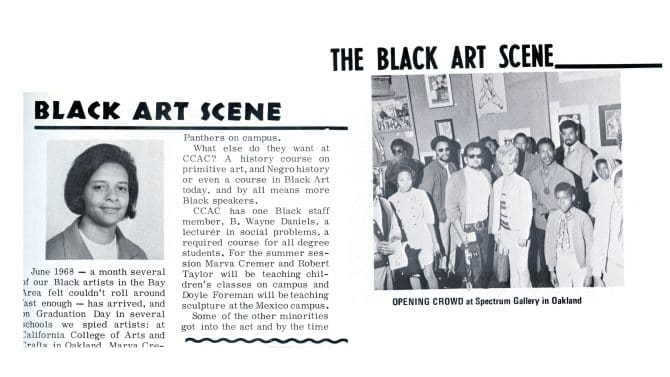
Montgomery also worked for Berkeley's Rainbow Sign (1971-1978, described as "somewhere between a Black Nationalist headquarters and middle class social club") as its Black Art consultant — at the time, a title held by only four or five people nationwide. As Rainbow Sign’s Black Art consultant, Montgomery oversaw the exhibitions and art programming, designed the invitation cards, titled the shows, and publicized events. In 2017, a digital archive of Rainbow Sign was collectively assembled by students of UC Berkeley to honor the significance of Rainbow Sign—to the Black Arts movement, to black feminism, and to a multicultural and transnational vision in the 1970s embodied by Montgomery and others.
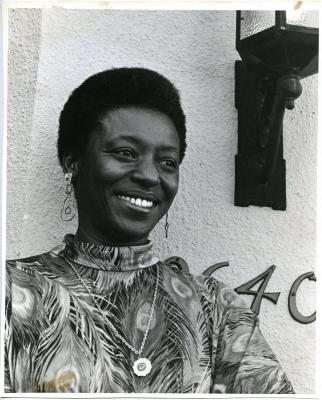
Read further
Learn more about African American art of the era at the Oakland Public Library
South of Pico : African American artists in Los Angeles in the 1960s and 1970s / Kellie Jones
1971 : a year in the life of color / Darby English
Additional Resources
AAMLO's study guide on Visual Art features more information about “New Perspectives in Black Art” as well as Montgomery's regular "Black Art Scene" feature in the Bayviewer magazine


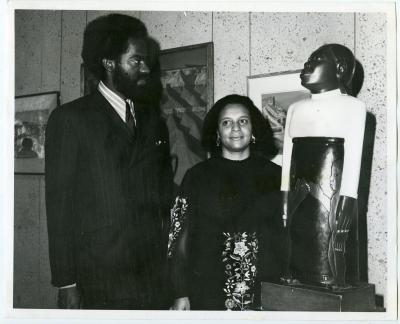
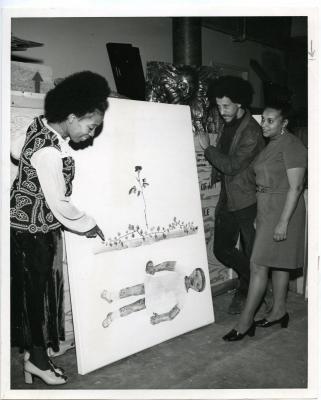
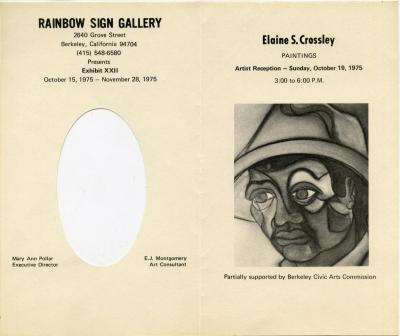

Add a comment to: E.J. (Evangeline) Montgomery: Oakland African American artists’ advocate